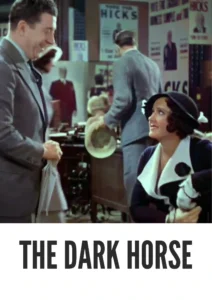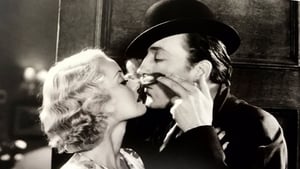Video Sources 0 Views

Download The Dark Horse (1932) Colorized HD | Warren William | Political Comedy
Synopsis
Backroom Deals and Accidental Success: The Dark Horse (1932) in Stunning Color

Enter the zany world of politics with The Dark Horse, a fast-paced and hilarious pre-Code comedy from 1932, now beautifully colorized for a viewing experience like never before. This film, starring Warren William and Bette Davis, satirizes the absurdity of political campaigns and the lengths people will go to for power. Perfect for classic film enthusiasts and those who enjoy witty, fast-talking comedies, this HD download brings a forgotten gem of early Hollywood to your screen.
The Dark Horse Storyline: From Obscurity to the Nomination
The Dark Horse follows the chaotic events surrounding the selection of a presidential nominee for a struggling political party. When the party’s leading candidate suddenly dies, they are left scrambling for a replacement. The opportunistic Sam Wilson (Warren William), a professional campaign manager, sees his chance for advancement and convinces the party bosses to nominate Zachary T. Hicks (Guy Kibbee), an unassuming and somewhat clueless man, as their “dark horse” candidate.Sam believes he can easily manipulate Hicks, but he underestimates the power of public opinion and the unexpected influence of Hicks’s fiery and independent-minded daughter, Kay (Bette Davis). As Sam orchestrates a series of publicity stunts and backroom deals, Hicks surprisingly gains popularity, threatening Sam’s carefully laid plans. The film explores themes of political corruption, manipulation, and the unpredictable nature of public sentiment. Ultimately, The Dark Horse is a sharp and satirical look at the absurdities of American politics and the power of the underdog.
Movie Cast
The film features a stellar cast of actors who bring this comedic tale to life:
- Warren William as Sam Wilson
- Bette Davis as Kay Russell
- Guy Kibbee as Zachary T. Hicks
- Robert Barrat as Senator John P. Clark
- Sam Hardy as Al
Movie Genre
The Dark Horse falls into the genre of pre-Code political comedy, known for its fast-paced dialogue, satirical humor, and irreverent attitude towards authority. Its witty script and engaging performances make it a delightful and thought-provoking film.
Historical Context: Political Satire During the Great Depression
Released in 1932, The Dark Horse reflected the cynicism and disillusionment that many Americans felt towards politics during the Great Depression. The film lampooned the corrupt practices and self-serving motives that often drove political campaigns, offering a comedic release from the anxieties of the era. Its satire of the political system and its celebration of the underdog resonated with audiences who were struggling to make ends meet and felt powerless against the forces of economic hardship.
Colorization Details
This colorized version of The Dark Horse has been meticulously restored using modern digital techniques, enhancing the visual appeal while preserving the film’s original comedic timing and sharp wit. The colorization process involved carefully analyzing the grayscale tones of the original black and white footage and assigning appropriate colors to each scene. While the specific software used remains proprietary, the techniques employed included advanced algorithms for color palette selection and image enhancement. This painstaking process brings new life to the characters and settings, making the story even more engaging for modern audiences. While some may debate the merits of colorizing classic films, it introduces these films to a broader audience, ensuring their legacy for future generations.
Technical Details
- Director: Alfred E. Green
- Screenplay: Joseph Moncure March, Wilson Mizner
- Story: Melville Crossman
- Cinematography: Alfred Green
- Edited by: Ray Curtiss
- Production Company: Warner Bros. Pictures
- Distributed by: Warner Bros. Pictures
- Runtime: 75 minutes
Technical Specifications
- Download Format: MP4
- Resolution: HD (1080p)
- Compatibility: Compatible with most devices, including smartphones, tablets, computers, and smart TVs.
Reviews and Critical Reception
The Dark Horse (1932) is celebrated for its witty script, fast-paced direction, and strong comedic performances, particularly Warren William’s portrayal of the opportunistic Sam Wilson and Bette Davis’s feisty performance as Kay. While not as widely known as some of the era’s other comedies, it remains a delightful example of pre-Code Hollywood satire and a hidden gem for fans of classic film.
FAQs
- Q: What is The Dark Horse about?
- A: The Dark Horse is a political comedy about a campaign manager who tries to manipulate an unassuming candidate, only to have his plans backfire.
- Q: Does The Dark Horse (1932) feature Bette Davis?
- A: Yes, The Dark Horse features Bette Davis in an early role as Kay Russell, the candidate’s strong-willed daughter.
- Q: Is this version of The Dark Horse colorized?
- A: Yes, this version has been professionally colorized to enhance the viewing experience.
- Q: What makes Warren William’s performance in The Dark Horse so memorable?
- A: Warren William’s portrayal of the slick and manipulative Sam Wilson is celebrated for his fast-talking delivery and his ability to embody the character’s cynical wit.
- Q: What is the download format?
- A: The download format is MP4, which is compatible with most devices.
- Q: What resolution is the download?
- A: The resolution is HD (1080p), providing a high-quality viewing experience.
Download Now in HD!
Watch The Dark Horse Today!











